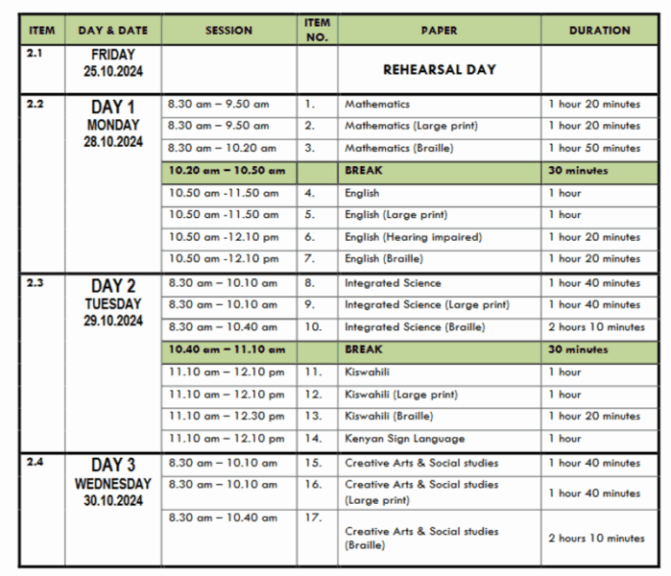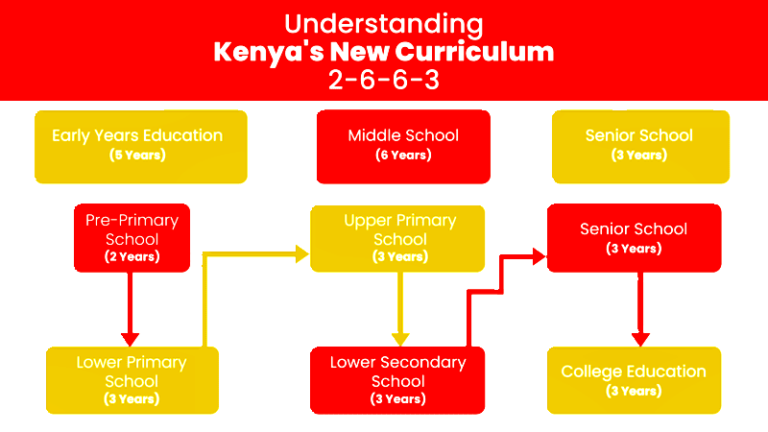
Today, Monday, October 28, 2024, the Kenya Primary School Education Assessment (KPSEA) officially begins, marking a significant milestone in the educational journey of 1,303,913 candidates nationwide. These students, stationed across 35,573 examination centers, represent Kenya’s ongoing shift to the Competency-Based Curriculum (CBC), which aims to equip learners with practical skills and holistic knowledge.
A Key Stage for CBC Learners
The KPSEA assessment evaluates Grade 6 students under the CBC framework, emphasizing hands-on learning and competency development over rote memorization. This approach reflects Kenya’s educational reforms, moving away from the Kenya Certificate of Primary Education (KCPE) to a more balanced assessment system designed to cater to varied learning paces and capabilities. Through KPSEA, students showcase their understanding across various subjects, laying the groundwork for their transition to junior secondary education. In addition, the KPSEA outcomes aim to provide insights into areas where the curriculum could adapt to foster a more supportive learning environment.
Timetable and Examination Structure
The Kenya National Examinations Council (KNEC) has provided a detailed three-day timetable for the KPSEA. The schedule is as follows:
- Monday, October 28: Mathematics and English
- Tuesday, October 29: Integrated Science and Kiswahili/Kenyan Sign Language
- Wednesday, October 30: Creative Arts and Social Studies
The exams started with a preparatory rehearsal on Friday, October 25, ensuring students were familiarized with exam protocols and testing conditions. This initial rehearsal gave candidates a sense of the exam environment, offering an opportunity to clarify guidelines and resolve any logistical issues before the main examination dates.
Guidelines and Exam Conduct
KNEC has implemented stringent guidelines to maintain the integrity of the examination process and ensure that every candidate’s performance is a fair representation of their capabilities. A primary rule states that no extra time will be allotted for any paper beyond what is prescribed in the timetable unless otherwise indicated on the exam paper itself. Additionally, students are expected to remain in the examination room until the session concludes, barring any exceptional permissions granted by the examination supervisor.
The council has issued reminders against carrying unauthorized materials or accessing electronic devices within the examination room, aiming to curb academic misconduct. KNEC has underscored the consequences for any candidate found engaging in irregularities, warning that such actions could lead to the cancellation of results in the relevant subjects. Furthermore, any broader irregularities that appear to involve entire examination centers could potentially lead to the annulment of all results from that center.
These measures are reinforced by the KNEC Act, which stipulates severe penalties for exam malpractice. Violations may result in fines, imprisonment, or both, underscoring KNEC’s commitment to preserving the credibility of Kenya’s educational assessments. To this end, KNEC has collaborated with schools and local authorities to monitor examination activities and address any instances of misconduct.
Support for Candidates and Supervisors
Recognizing the importance of a supportive examination environment, KNEC has instructed schools and teachers to help students understand the exam protocols and the importance of adhering to them. In preparation for KPSEA, teachers have guided students through the examination instructions, prepared them to manage their time effectively, and answered questions about examination logistics. Schools have also been advised to ensure a calm and conducive atmosphere to minimize the stress commonly associated with high-stakes assessments.
Moving Forward with KPSEA
As the first cohort of KPSEA candidates, these Grade 6 students are pioneers of Kenya’s revised approach to primary education. The assessments aim to evaluate academic knowledge and gauge essential skills like problem-solving, communication, and critical thinking. For many of these students, the outcomes will serve as a roadmap for their future educational paths, allowing educators and parents to identify strengths and areas needing further development.
The CBC’s implementation and the KPSEA’s introduction reflect a broader vision for Kenyan education—one that seeks to produce well-rounded, competent, and skilled learners prepared for a dynamic global environment. This week’s assessments are a critical component of this vision, marking both a transition and a celebration of Kenya’s commitment to modernizing education.
The country supports these young learners as the exams proceed, wishing them success and resilience in navigating this critical chapter of their academic journeys.

